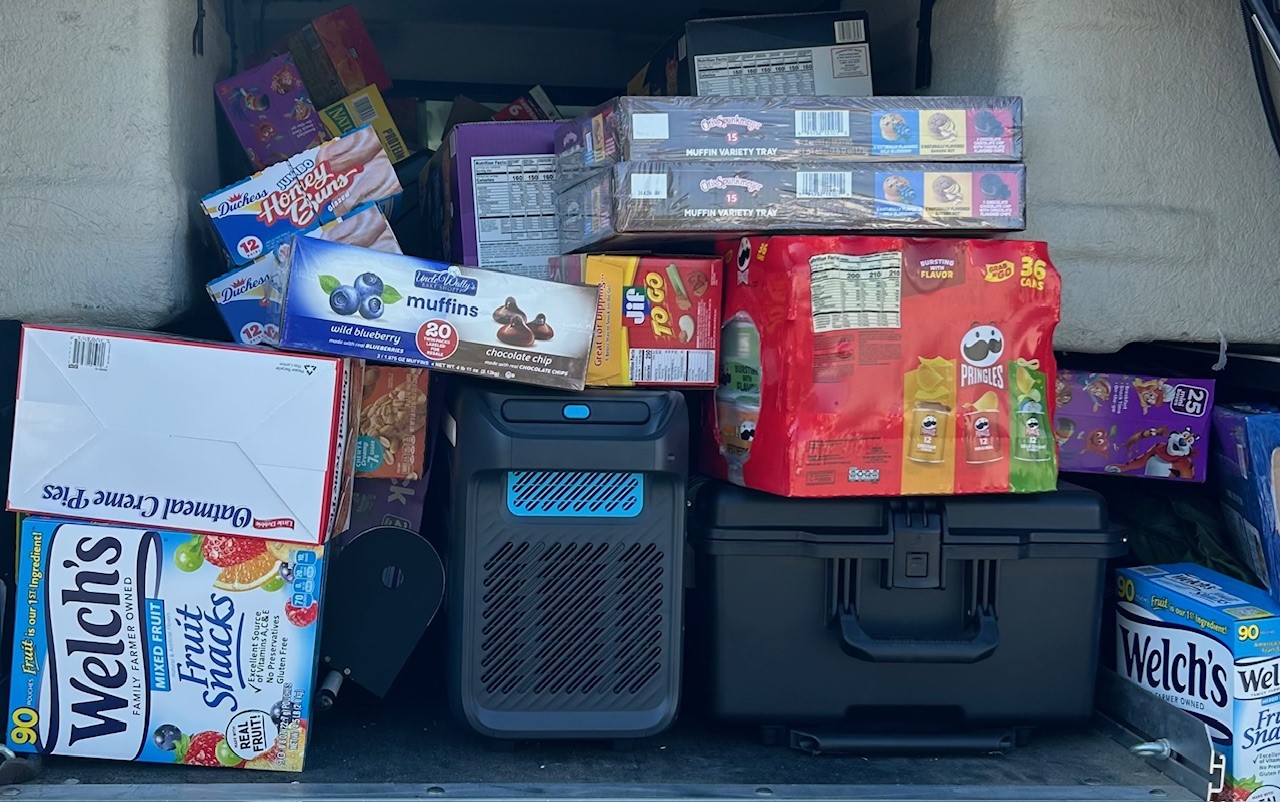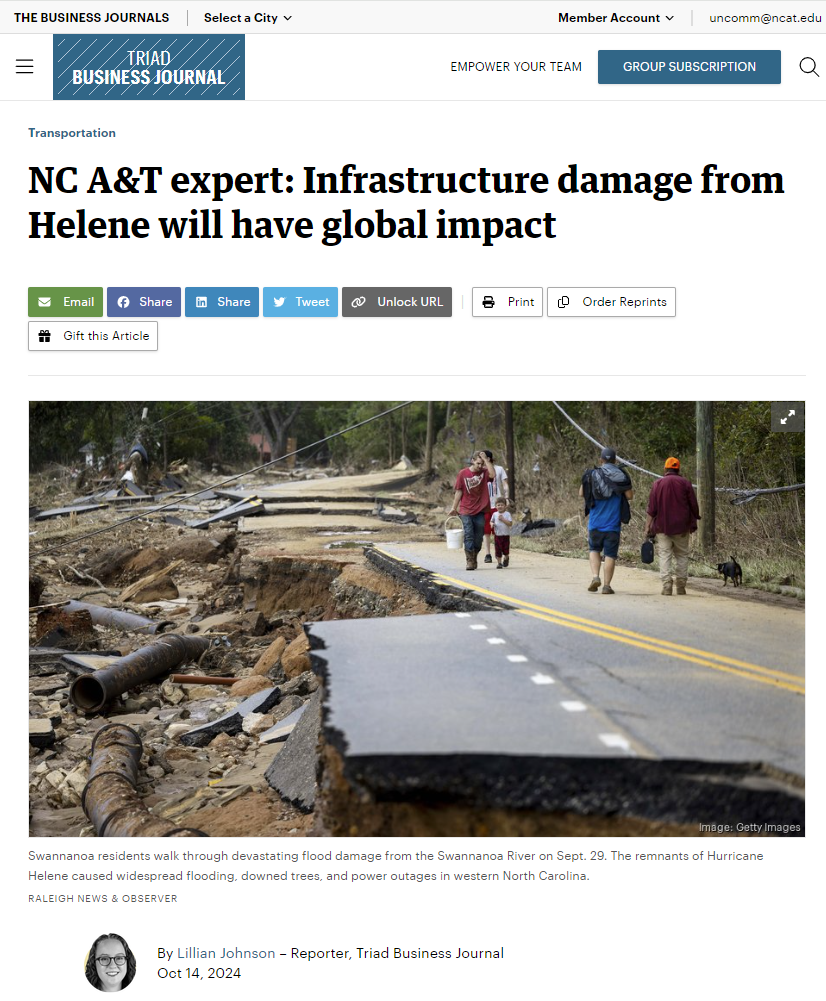
N.C. A&T Joins NCShare Partnership, Enhances Computing and Data Modeling Capacity
04/23/2025 in Research, College of Engineering
By Todd Simmons / 10/14/2024 Student Affairs, Human Resources, Employees, Students
EAST GREENSBORO, N.C. (Oct. 14, 2024) – In the wake of catastrophic flooding, death and extensive property damage caused by Hurricane Helene in Western North Carolina, North Carolina Agricultural and Technical State University employees and students have stepped up in numerous ways to support communities in areas that experienced the heaviest destruction.
Aggies showed up from the very beginning of the recovery effort, sending supplies, resources and personnel to Asheville on Saturday, Sept. 28, just hours after Helene blew through the area. Interim Police Chief Jack Moorman, Emergency Management Director Travis Auman and Officer Nicholas Poole drove two trucks to the University of North Carolina-Asheville campus stocked with food, water and equipment.
Moorman and Poole worked with the UNC-Asheville campus police department, bringing much-needed safety and security guidance and assistance to the few local officers available “They were able to provide the most valuable thing possible for the local team – rest,” said Auman. “They continue to provide support and assist in coordination of incoming officers.”
Auman worked with UNC-Asheville’s Emergency Operations Center and emergency management team, coordinating resource requests to the state, as well as management of those resources. Over two days, the A&T trio assisted in evacuation of all 1,100 student residents to safer locations and coordinated three meals a day for students and staff still on campus and for more than 300 first responders in Asheville. They also assisted in community-wide water distribution.
 “All of this was done in an environment with no power, running water and limited communication capabilities,” said Auman.
“All of this was done in an environment with no power, running water and limited communication capabilities,” said Auman.
Back in Greensboro, the university is providing counseling and student health center services to students from UNC-Asheville who have returned home to the Piedmont Triad area, and assisting A&T students from impacted areas in North Carolina, Georgia, Florida and Tennessee. Colleagues in Academic Affairs are helping UNC-Asheville with planning resources to support resumption of academic instruction.
Various students and student organizations have stepped up to gather bottled water, baby diapers, paper towels and food for Western North Carolina residents. At an Oct. 9 campus political forum, for instance, members of Kappa Alpha Psi fraternity and the N.C. A&T NAACP chapter gathered stacks of supplies donated by forum attendees and shipped them to Western North Carolina the following day.
The university has provided a special option for students from any of the affected areas who cannot continue their studies this semester to be able to withdraw from classes with no academic or financial repercussions. Students need only complete the Hurricane Helene Academic Flexibility Form by Oct. 30.
A&T is also providing support for university employees who live or work in any of the affected areas. As a land-grant institution, A&T co-administers the North Carolina Cooperative Extension Service with North Carolina State, and has offices and personnel in counties across the state. A&T also has a significant research presence at the North Carolina Research Campus in Kannapolis, 30 miles northeast of Charlotte and closer to the flood areas: The Center for Excellence in Post-Harvest Food Technologies.
The Division of Human Resources has published a resources website for employees with information and links to various support and recovery organizations, as well as leave and work provisions available to A&T employees who reside or work in one of the 27 counties impacted by Helene. Click here to visit the site.
 Chancellor James R. Martin II has pitched in, as well. An internationally known geotechnical earthquake and risk expert and civil engineer, Martin has been in dialogue with engineering teams working to restore major infrastructure damaged by the storm. Across the region, roads have been heavily impacted and in some instances completely washed away. Utility lines, water pipes, telephone infrastructure and other resources critical to the ability of many communities, towns and cities to operate all suffered extensive damage, as well.
Chancellor James R. Martin II has pitched in, as well. An internationally known geotechnical earthquake and risk expert and civil engineer, Martin has been in dialogue with engineering teams working to restore major infrastructure damaged by the storm. Across the region, roads have been heavily impacted and in some instances completely washed away. Utility lines, water pipes, telephone infrastructure and other resources critical to the ability of many communities, towns and cities to operate all suffered extensive damage, as well.
Martin has shared insight with media reporting on the complications of recovery, including the Triad Business Journal and WFMY-News 2. Martin has compared the damage from Helene in Western North Carolina. to the damage he encountered in the Honshu province of Japan after a deadly tsunami hit in 2011: Both incidents involved extensive flooding and major failure of essential infrastructure.
In the Triad Business Journal, he cautioned that as complex infrastructure rebuilding efforts get underway, it’s important not to lose sight of the storm’s impact on people. “You can talk about statistics, but when you start talking about the story of one person or one family, that makes it real. Sometimes we forget these things when we’re talking about policy or talking about how to move forward.”
A&T participants in recovery efforts stress that support is still needed. Numerous organizations are involved in support efforts. Here are several to consider:
Media Contact Information: thsimmons@ncat.edu